人教版初三英语导学案
人教版九年级英语Unit-6导学案
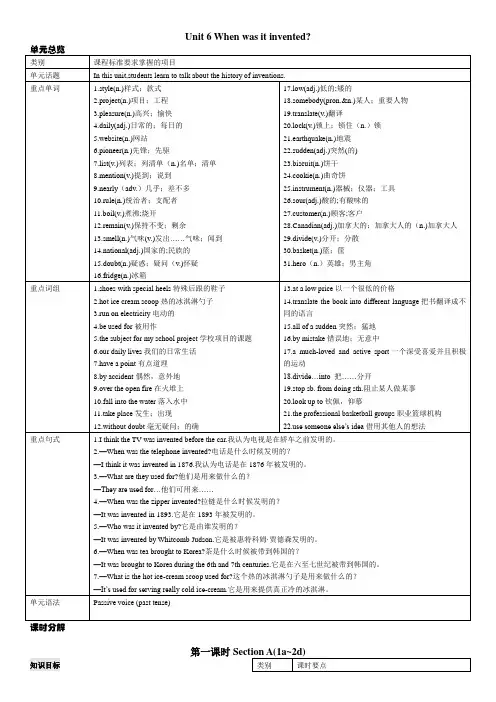
Unit 6 When was it invented?课时分解第一课时知识目标§自主学习方案【新词自查】根据句意及汉语提示完成句子。
1.I like the color of this coat but I don’t like its style (款式).2.It’s my great pleasure (高兴) to have a talk with you.3.The little inventions have helped me a lot in my daily (日常的)life.4.Julia introduced a good website (网站)to me to learn English.5.My mother always lists(列清单)all things that she wants to buy before shopping.§课堂导学方案Step 1情景导入参考案例Teacher: There are many useful things in the world.They help us a lot in life.(Show some pictures on the screen) When were they invented?Students:_______________________________①The telephone was invented in 1876.②The computer was invented in……(4分钟)环节说明:通过课前的一个师生问答互动引入新课的话题;通过图片的展示和语言的描述创设了情境,激发了学生的学习兴趣和表达欲望。
Step 2完成教材1a-1c的任务【操作案例】1.要求学生翻开课本P41,迅速阅读1a部分的内容。
并按要求完成课本上相应的任务。
(1分钟)2.检查答案,要求全班一起给出答案并检查讨论。
人教版九年级上册英语全册导学案(学生用用2023年秋修订)
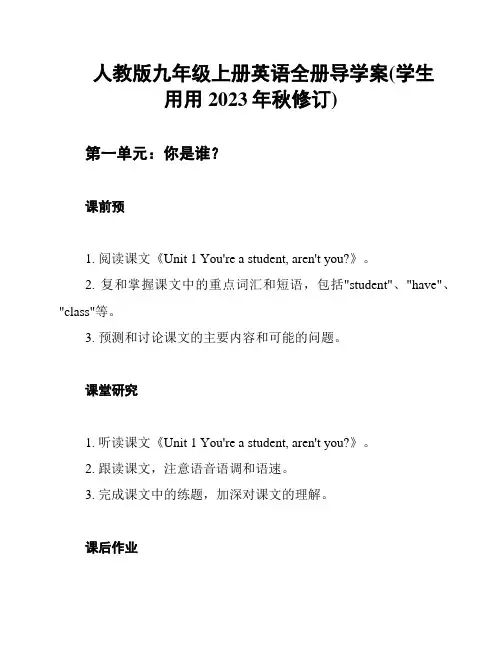
人教版九年级上册英语全册导学案(学生用用2023年秋修订)第一单元:你是谁?课前预1. 阅读课文《Unit 1 You're a student, aren't you?》。
2. 复和掌握课文中的重点词汇和短语,包括"student"、"have"、"class"等。
3. 预测和讨论课文的主要内容和可能的问题。
课堂研究1. 听读课文《Unit 1 You're a student, aren't you?》。
2. 跟读课文,注意语音语调和语速。
3. 完成课文中的练题,加深对课文的理解。
课后作业1. 背诵和默写课文中的重点句子。
2. 扩展课文中的对话,用自己的话描述一下自己是谁,并询问对方的身份。
3. 总结课文中的语法知识点,如否定句和一般疑问句的构成。
第二单元:我的课程课前预1. 阅读课文《Unit 2 What classes do you have?》。
2. 复和掌握课文中的重点词汇和短语,包括"course"、"like"、"math"等。
3. 预测和讨论课文的主要内容和可能的问题。
课堂研究1. 听读课文《Unit 2 What classes do you have?》。
2. 跟读课文,注意语音语调和语速。
3. 完成课文中的练题,加深对课文的理解。
课后作业1. 背诵和默写课文中的重点句子。
2. 用英语列举出你所上的课程,并描述你对每门课程的感受。
3. 总结课文中的语法知识点,如可数与不可数名词的用法。
第三单元:我的家人课前预1. 阅读课文《Unit 3 My family》。
2. 复和掌握课文中的重点词汇和短语,包括"family"、"sister"、"father"等。
3. 预测和讨论课文的主要内容和可能的问题。
人教版九年级英语Unit 3导学案
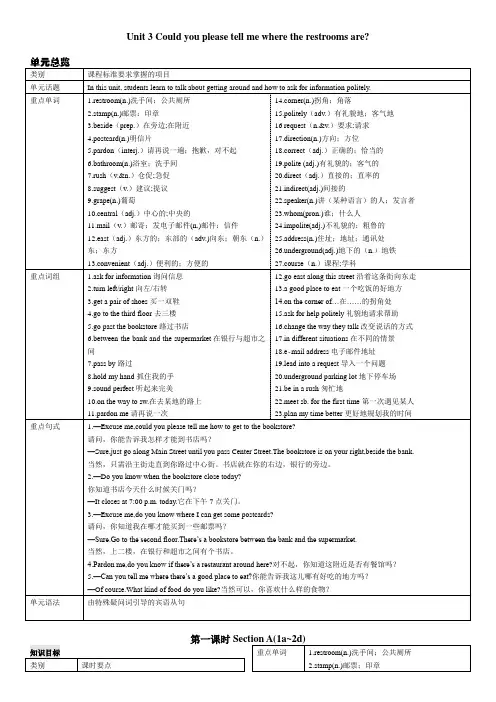
Unit 3 Could you please tell me where the restrooms are?类别课程标准要求掌握的项目单元话题In this unit, students learn to talk about getting around and how to ask for information politely.重点单词 1.restroom(n.)洗手间;公共厕所2.stamp(n.)邮票;印章3.beside(prep.)在旁边;在附近4.postcard(n.)明信片5.pardon(interj.)请再说一遍;抱歉,对不起6.bathroom(n.)浴室;洗手间7.rush(v.&n.)仓促;急促8.suggest(v.)建议;提议9.grape(n.)葡萄10.central(adj.)中心的;中央的11.mail(v.)邮寄;发电子邮件(n.)邮件;信件12.east(adj.)东方的;东部的(adv.)向东;朝东(n.)东;东方13.convenient(adj.)便利的;方便的14.corner(n.)拐角;角落15.politely(adv.)有礼貌地;客气地16 request(n.&v.)要求;请求17.direction(n.)方向;方位18.correct(adj.)正确的;恰当的19.polite (adj.)有礼貌的;客气的20.direct(adj.)直接的;直率的21.indirect(adj.)间接的22.speaker(n.)讲(某种语言)的人;发言者23.whom(pron.)谁;什么人24.impolite(adj.)不礼貌的;粗鲁的25.address(n.)住址;地址;通讯处26.underground(adj.)地下的(n.)地铁27.course(n.)课程;学科重点词组 1.ask for information询问信息2.turn left/right向左/右转3.get a pair of shoes买一双鞋4.go to the third floor去三楼5.go past the bookstore路过书店6.between the bank and the supermarket在银行与超市之间7.pass by路过8.hold my hand抓住我的手9.sound perfect听起来完美10.on the way to sw.在去某地的路上11.pardon me请再说一次12.go east along this street沿着这条街向东走13.a good place to eat一个吃饭的好地方14.on the corner of…在……的拐角处15.ask for help politely礼貌地请求帮助16.change the way they talk改变说话的方式17.in different situations在不同的情景18.e-mail address电子邮件地址19.lead into a request导入一个问题20.underground parking lot地下停车场21.be in a rush匆忙地22.meet sb. for the first time第一次遇见某人23.plan my time better更好地规划我的时间重点句式 1.—Excuse me,could you please tell me how to get to the bookstore?请问,你能告诉我怎样才能到书店吗?—Sure,just go along Main Street until you pass Center Street.The bookstore is on your right,beside the bank.当然,只需沿主街走直到你路过中心街。
最新人教版九年级英语全一册导学案(全册 共209页)
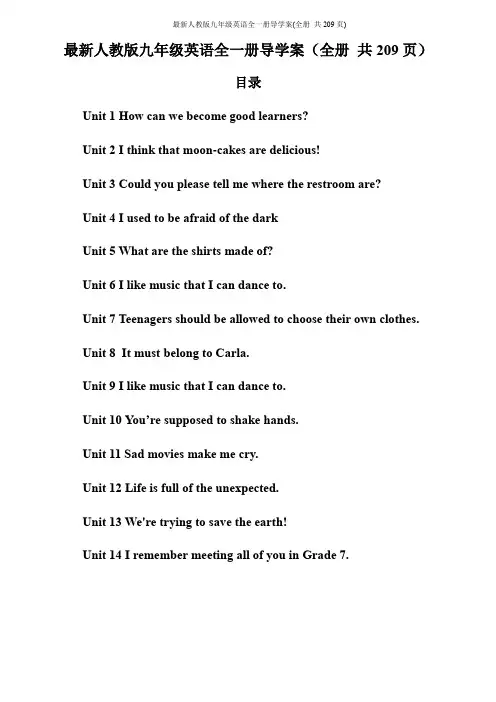
最新人教版九年级英语全一册导学案(全册共209页)目录Unit 1 How can we become good learners?Unit 2 I think that moon-cakes are delicious!Unit 3 Could you please tell me where the restroom are?Unit 4 I used to be afraid of the darkUnit 5 What are the shirts made of?Unit 6 I like music that I can dance to.Unit 7 Teenagers should be allowed to choose their own clothes.Unit8It must belong to Carla.Unit 9 I like music that I can dance to.Unit10You’re supposed to shake hands.Unit 11 Sad movies make me cry.Unit 12 Life is full of the unexpected.Unit 13 We're trying to save the earth!Unit 14 I remember meeting all of you in Grade 7.Unit 1 How can we become good learners?to be patient4. Try to guess a word’s meaning by reading the sentences before and after it.sentence n.Please use this word to make a sentence. make a sentence 五、练评(包含“考点链接” 应用探究 6分钟) 单项选择。
人教版九年级英语上册全册导学案
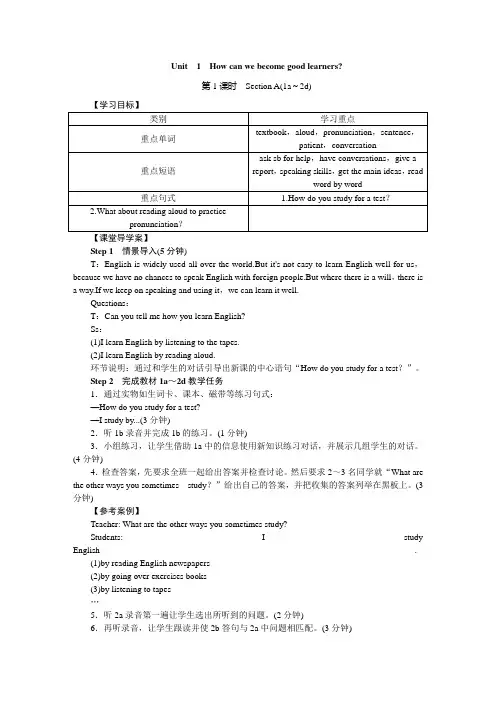
Unit 1How can we become good learners?第1课时Section A(1a~2d)【学习目标】Step 1情景导入(5分钟)T:English is widely used all over the world.But it's not easy to learn English well for us,because we have no chances to speak English with foreign people.But where there is a will,there is a way.If we keep on speaking and using it,we can learn it well.Questions:T:Can you tell me how you learn English?Ss:________________________________________________________________________(1)I learn English by listening to the tapes.(2)I learn English by reading aloud.环节说明:通过和学生的对话引导出新课的中心语句“How do you study for a test?”。
Step 2完成教材1a~2d教学任务1.通过实物如生词卡、课本、磁带等练习句式:—How do you study for a test?—I study by...(3分钟)2.听1b录音并完成1b的练习。
(1分钟)3.小组练习,让学生借助1a中的信息使用新知识练习对话,并展示几组学生的对话。
(4分钟)4.检查答案,先要求全班一起给出答案并检查讨论。
然后要求2~3名同学就“What are the other ways you sometimes study?”给出自己的答案,并把收集的答案列举在黑板上。
人教版英语九年级全册精品导学案汇总
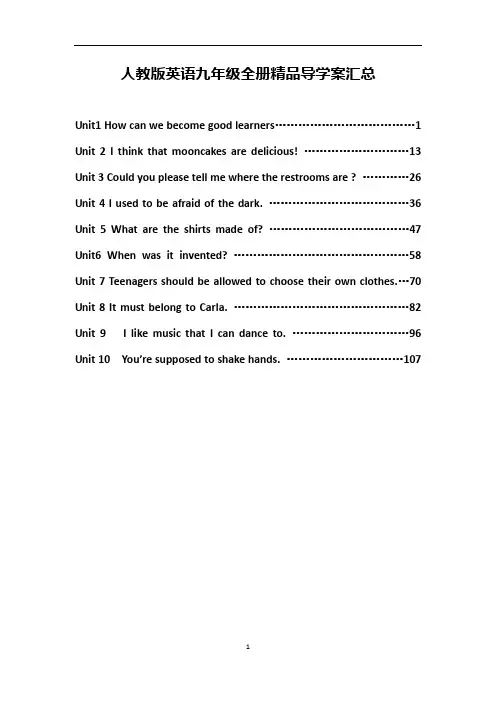
Unit1 How can we become good learners (1)Unit 2 I think that mooncakes are delicious! (13)Unit 3 Could you please tell me where the restrooms are ? (26)Unit 4 I used to be afraid of the dark. (36)Unit 5 What are the shirts made of? (47)Unit6 When was it invented? (58)Unit 7 Teenagers should be allowed to choose their own clothes (70)Unit 8 It must belong to Carla. (82)Unit 9 I like music that I can dance to. (96)Unit 10 You’re supposed to shake hands (107)Unit1 How can we become good learnersPeriod 1 Section A 1a—2c班级:___________组名:_____________ 姓名:_______________【学习目标】1、会拼读、能识记新单词:aloud pronunciation flashcard vocabulary.2、能够识记、运用下列短语:work with friends,ask the teacher for help,read aloud,make flashcards,practice pronunciation3、能够运用下列句型完成学习任务。
--- How do you study for a test? --- I study by working with a group.【学习重点】掌握by的用法【学习难点】掌握by的用法以及表述学习英语的方法【学习过程】一、目标呈现1.How do you study English ?---- I study by_______________________.(听磁带)1)自主预习1a--2c,完成下面的短语。
(2023年整理)人教版九年级英语全册导学案
(2023年整理)人教版九年级英语全册导学案2023年整理人教版九年级英语全册导学案第一单元:动词用法目标:研究动词的基本用法和常见短语1.1 课文导学- 研究动词的基本概念和特点- 掌握动词的基本用法:时态、数量、人称等- 了解常用动词短语的意义和用法1.2 参考练1. 单项选择题:- I usually _____ (go/goes) to school by bus.- They _____ (is/are) cleaning the classroom now.2. 完成句子:- He has ______ (do) his homework already.- We will ______ (not go) swimming tomorrow.1.3 拓展练1. 写一篇100字以上的短文,描述你喜欢做的一件事情。
要求使用动词的各种时态。
2. 根据所给情景,完成对话。
(请参考附件D)课堂作业- 完成参考练1.2和1.3- 阅读并预第二单元内容---第二单元:阅读理解目标:培养阅读理解能力,提高阅读速度和思维逻辑思维能力2.1 课文导学- 研究阅读理解的基本方法和技巧- 掌握理解课文的关键信息- 提升阅读速度和理解能力2.2 参考练1. 阅读短文,并回答问题:- When is Halloween celebrated?- What costume did the girl wear?- How did they celebrate Halloween?2. 根据短文内容,填写下面表格:| Name | Age | Favorite Sport |2.3 拓展练1. 阅读一篇新闻报道,并写一篇100字以上的摘要。
2. 分析一篇英文演讲稿,写出主要论点和支持论据。
课堂作业- 完成参考练2.2和2.3- 预下一单元内容---第三单元:口语表达目标:提高口语表达能力和自信心3.1 课文导学- 研究常用口语表达方式和惯用语- 掌握日常对话中常见的口语表达方式- 培养口语思维的能力3.2 参考练1. 根据图片提示,描述其中的内容,并使用合适的口语表达方式。
UNIT3复习导学案人教版九年级英语全册
九年级unit3 导学案一、单词1.(美)洗手间;公共厕所2..邮票;印章3.明信片4.请再说一遍;抱歉,对不起5.洗手间;厕所6.浴室;洗手间7.快的;迅速的adv. 快速地;迅速地8.仓促;急促9.建议;提议10.管理人员;职工11.葡萄12.中心的;中央的13.邮寄;发电子邮件n. 邮件;信件14.东方的;东部的adv. 向东;朝东n. 东;东方15.迷人的;极有吸引力的16.便利的;方便的17.购物中心18.职员19.拐角;角落20.有礼貌的;客气的21.礼貌地;客气地22.(某种语言)的人;发言者23.要求;请求24.选择;挑选25.方向;方位26.正确的;恰当的27.直接的;直率的28.谁;什么人29.住址;地址;通讯处30.忠实地;忠诚地31.意大利(人)的;n. 意大利人;意大利语二、短语1. 向右/左_____________2. 以……开始_____________3.路过;经过_____________4.买一双鞋_____________5.取一些钱_____________6.沿着_____________7.买一些杂志_____________8.做某事很兴奋_____________9. 在左边/右边_____________10. 没问题_____________11. 在那时_____________12. 在银行旁边_____________13. 怎样到达……_____________14.在……和……之间_____________15. 获取一些有关小镇的信息_____________16. 抱歉;对不起;请再说一遍_____________17.与某人交流_____________18.依靠;依赖_____________19.去……的角落_____________20.使用合适的语言_____________21. 花费时间做某事_____________22.听起来更有礼貌_____________23.寻求帮助_____________24. 导入_____________25.例如_____________26.一个地下停车场_____________27.学会怎样才是礼貌的_____________28.一个吃饭的地方_____________29.在不同的情况下_____________三、句子1.我很激动尝试那些游乐设施。
人教版九年级英语(全册)精品导学案汇总
人教版九年级英语(全册)精品导学案汇总Unit 4课下能力提升(一) (2)Unit 4课下能力提升(二) (14)Unit 4课下能力提升(三) (24)Unit 4课下能力提升(四) (35)Unit 5课下能力提升(五) (46)Unit 5课下能力提升(六) (58)Unit 5课下能力提升(七) (68)Unit 5课下能力提升(八) (75)Unit 6课下能力提升(九) (78)Unit 6课下能力提升(十) (90)Unit 6课下能力提升(十一) (102)Unit 6课下能力提升(十二) (119)单元质量检测(一) (134)单元质量检测(二) (154)单元质量检测(三) (178)Unit 4课下能力提升(一)Ⅰ.单词拼写1.When an animal is under ________ (攻击), it chooses to run away or fight back.2.My wallet has ________ (消失) from the table.3.It is ________ (明显的) that she is very clever.4.I feel bad that I didn't ________ (提供) any food to them.5.The ________ (破坏) of the natural living places makes wild animals less and less.6.Profits of all companies are being a________ by the economic crisis.7.Since you know smoking does great h________ to your health, why not give it up?8.By keeping a diary, you can improve your writing skills more r________.9.Our washing machine broke down yesterday and f________ the kitchen.10.The plane c________ into the mountain, but luckily the pilot survived.Ⅱ.单句语法填空1.Everybody in the village likes Jack because he is good at telling and making ________ jokes.2.Organizations of all kinds now recognize the Internet as effective means for ________ (globe) communication.3.At dawn the army ________ (attack) the town and finally captured it.4.She could have been ________ focus of everyone's attention, but to her disappointment, all people in the picture were out ________ focus.5.It was never clear ________ the man hadn't reported the accident sooner.6.—I'll give Bob a ring.—You should. You haven't been in touch ________ him for ages.7.He wishes to become a football star and hopes it will come ________ some day.8.The audience complained that too much advertising ________ (affect) the quality of the programs.Ⅲ.完成句子1. Look at the dark clouds in the sky. It looks ______________________________________ (好像要下雨).2.______________________ (真遗憾) you couldn't come to my birthday party.3.______________________ (很显然) she will marry him.Ⅳ.课文缩写语法填空In the last thirty years, the Internet has grown 1.________,and this growth is clearly going to continue.Some experts are pessimistic 2.________ the future.One worry is crime in cyberspace.In the future, terrorists may “attack”the world's computers, cause chaos, make planes 3.________ trains crash.4.________,many people are optimistic about the future of 5.________ Internet.Already, users can buy books, find out about holiday offers and so on.Angela Rossetto believes that, in the future, we will get6.________(entertain) from the Net and that television will probably7.________(appear). The mail service may also vanish (消失) with the increasing use of e?mail.Some experts see our future in virtual 8.________ (real) —the use of computers with sounds and pictures 9.________ make you feel as if you are in 10.________ real situation.Ⅴ.完形填空Dear Mr Armstrong,I was pleased to receive your letter, asking what advice I would give to the members of your club. In my opinion, __1__ field offers greater __2__ than newspaper work for young people with __3__ in writing.Of course I'm not speaking of __4__ rewards. Anyone who wants to get rich should choose some other __5__. I can't even promise you excitement. A newspaper reporter might have to __6__ the same dutiesday after day. But journalism pays a living wage, and it often makes a reporter feel more __7__ than a bank president. Who can say that he is not?You have asked me __8__ to become a journalist.First, learn how to __9__ a computer. This is one thing you must be able to do. You can either learn the __10__ in school or buy a book that __11__ how to teach yourself.At school you should learn how to read and write your own __12__ well. You should also learn history, government, mathematics and __13__. Foreign languages are also good to know. The things that __14__ every day are not simple, and a journalist has to know__15__ in order to understand them.If your school has a __16__,you should write for it. Editors like young people who have had experience __17__ for school papers.There are many things you can do to prepare __18__ for a newspaper job. Read everything you can, __19__ newspapers and magazines. Discuss what you read and __20__ your own opinions.If the members of your club have any questions that haven't been answered by this letter, please write again.YoursEditor, NYT1.A.this B.noC.every D.each 2.A.awards B.rewards C.returns D.advantage 3.A.an interest B.excitement C.curiosity D.a love 4.A.spiritual B.individual C.collective D.material 5.A.position B.school C.occupation D.business 6.A.face B.perform C.carry D.take 7.A.wealthy B.excited C.important D.burdened 8.A.how B.whether C.when D.where 9.A.fix B.find C.use D.get 10.A.subject B.ability C.knowledge D.skill 11.A.writes B.reads C.introduces D.explains 12.A.book B.languageC.homework D.notes13.A.physics B.scienceC.English D.biology14.A.happen B.existC.show D.appear15.A.a lot B.a littleC.a bit D.a few16.A.club B.textbookC.newspaper D.library17.A.editing B.printingC.paying D.working18.A.yourself B.ourselvesC.themselves D.itself19.ly B.certainlyC.especially D.specially20.anize B.changeC.form D.makeⅥ.阅读理解Tim Berners?Lee is the man who wrote the software programme that led to the foundation of the World Wide Web. Britain played an important part in developing the first generation of computers. Theparents of Tim Berners?Lee both worked on one of the earliest commercial computers and talked about their work at home. As a child he would build models of computers from packaging material. After graduating from Oxford University he went on to the real thing. In the 1980's, scientists were already using a primitive version (原始版本) of e?mail. While working at a laboratory in Switzerland Tim Berners?Lee wrote a programme which let him store these messages. In 1990 he wrote the HTTP (服务程序所用的协议) and HTML (超文本链接标示语言) programmes which form the basis of the World Wide Web.The next year his programmes were placed on to the Internet. Everyone was welcome to use them and improve them if they could. Programmers used his codes to work with different operating systems. New things like web browsers (浏览器) and search engines were developed. Between 1991 and 1994 the number of web pages rose from 10 to 100, 000.In 1994 Tim Berners?Lee formed the newly formed World Wide Web Consortium (协会) or W3C.More than 200 leading companies and laboratories are represented (代表) by W3C.Together they make sure that everyone can participate equally on the Web.1.The main idea of this passage is ________.A.when the Internet appearedB.how Tim Berners?Lee formed W3CC.why computers develop so rapidlyD.how the World Wide Web started2.Scientists began to use e?mail ________.A.in 1980 B.after the 1980'sC.in the 1980's D.in the 1960's3.Which of the following is NOT true?A.The number of web pages rose very rapidly in the 1990's.B.Tim's programmes were placed on to the Internet in 1990.C.The World Wide Web will have an effect (影响) on social development.D.Tim Berners-Lee made a great contribution to the computer science.课下能力提升(一)Ⅰ.1.attack 2.disappeared 3.obvious4.offer 5.destruction 6.affected7.harm8.rapidly9.flooded10.crashedⅡ.1.up 2.global 3.attacked 4.the; of 5.why 6.with7.true 8.has affectedⅢ.1.as if it's going to rain 2.It's a pity that3.It's obvious thatⅣ.1.rapidly 2.about 3.and 4.However5.the 6.entertainment7.disappear8.reality9.that/which10.aⅤ.语篇解读:本文是一封回信,回答了来信中提出的问题,并对有兴趣从事新闻工作的人提出了建议。
最新人教版九年级英语全一册导学案(全册共209页)
最新人教版九年级英语全一册导学案第一单元:Making a Difference1.1 Unit Overview本单元主要介绍了如何通过做出积极影响来改变世界。
学生将学习一些社会公益组织的工作以及如何参与其中。
通过这个单元,学生将培养自己的改变世界的意识。
1.2 Learning Objectives本单元学习目标如下:•了解一些社会公益组织的工作。
•引导学生参与社会公益组织的活动。
•提高学生的口语表达和写作能力。
•培养学生的团队合作和领导能力。
1.3 Teaching Resources本单元所需要的教学资源如下:•人教版九年级英语全一册教材•多媒体设备•学生参与的社会公益组织信息1.4 Lesson Plan下面是本单元的教学安排推荐:课时教学内容学习活动1Introduction toUnit 观看介绍公益组织的视频,讨论其重要性和影响。
2The Power of One学生小组内讨论如何一个人能够改变世界。
3SocialOrganizations 学生小组研究不同社会公益组织的工作。
4Taking Action分组讨论并确定一个公益项目,制定行动计划。
5Presentations各小组展示他们的社会公益项目,并相互评价。
6Reflection andReview 学生写一篇关于此单元学习经历和收获的反思文章。
1.5 Assessment学生将通过以下方式进行考核:•参与小组讨论和展示的表现评价。
•行动计划的设计和执行能力。
•反思文章的书写和表达能力。
1.6 Extension Activities为了提高学生对公益事业的认识和参与度,可以开展以下延伸活动:•参观当地的公益组织或参与志愿者活动。
•组织学生自发开展公益项目并进行实施。
•建立学生公益社团,持续进行公益活动。
第二单元:Travel and Adventure2.1 Unit Overview本单元主要介绍了不同类型的旅行和探险,展示了不同文化和地理环境的魅力。
- 1、下载文档前请自行甄别文档内容的完整性,平台不提供额外的编辑、内容补充、找答案等附加服务。
- 2、"仅部分预览"的文档,不可在线预览部分如存在完整性等问题,可反馈申请退款(可完整预览的文档不适用该条件!)。
- 3、如文档侵犯您的权益,请联系客服反馈,我们会尽快为您处理(人工客服工作时间:9:00-18:30)。
人教版初三英语导学案Unit 1 Section A 课型:听说课一学习目标How do you study for a test?1、掌握本单元的重点单词、短语。
2、学习how 引导的特殊疑问句。
3、学习by + doing ,表示“通过??的方式或手段。
二、学习过程I、课前朗读(1)读本单元的单词、短语、句子等。
(2)找出Section A 中的下列短语:制作抽认卡小组学习记笔记提高英语的最好办法II、导入新课We have learnt English for two years .And how do you study English ? III、展示新知识—How do you study English ? —I study English by listening to tapes. IV、小组合作专项练习两人一组,进行对话练习,说出学习英语的方法或手段。
然后检查他们的练习情况。
T:—How do you study English ? S:—I study English by making flashcards. 学生把听到的学习方式写下来,然后加以补充,越多越好。
(1)(2)(3)(4)(5)(6)学生根据上面的内容,进行对话练习列单词表记单词具体建议大声朗读学习语法感受不同提高口语表达能力练习发音听录音加入英语俱乐部11) S1:—How do you study English ? S2:—I study by asking the teacher forhelp. S1:—How does S2 study English ?S3:—He studies English by asking the teacher for help. 思考:by后跟(动词原形/动词ing 形式)此句型可用来表示V、听录音,完成听力内容。
1、听1b,然后两人一组练习对话:S1:—How do you study English ? S2:—I study by askingthe teacher for help. 然后转换人称,练习对话:S1:—How does he/she studyEnglish ? S2:—He /She studies English by asking the teacher for help. 2、听2a,2b, 然后小组讨论,像这样练习下面的对话:(1) S1:—Do you study by practicingconversations with friends S2:—Yes, I do. S1:—How about you? S3:—No, I don’t. I study by taking notes. (2) S1:—Have you ever studied with a group? S2:—Yes, I have. I have learned a lot that way. S3:—No, I haven’t. VI、学以致用:读3a,完成下面的表格:Way of learning English Not successful Lillian Li Wei Ming Liu Chang 精讲点拨:(可供参考)1、What about reading aloud to practice pronunciation? aloud, loud 和loudly 叨急硎尽按笊亍? ,均可作副词,但用法有所区别。
(1)aloud 强调发出的声音能听叫,意为“岀声地” “大声地”,常与read, 或OK Successful2call 等动词连用,无比较级和最高级。
Don’t call aloud.不要大声的打电话。
(2)loud 意为“响亮地;大声地;高声地” ,侧重发出的音量大、传得远,loud 往往与比较级连用,用来修饰speak, talk, laugh 等动词。
Loud还可用作形容词。
I don’t dare to speak loud. 我不敢大声说话。
He spoke in a loud voice. 他大声洪亮的讲了话。
(3)loudly 意为“响亮地” ,其基本意义与loud 相同,还常与ring ,knock 等动词连用。
Loudly 用在动词前后均可,含有“喧闹”或“噪杂” 的意思。
The bell is ringing loudly. 铃正大声地响着。
2、end (1) end up doing sth. 以??结束。
The twins always end up arguing with each other. (2) inthe end =at last 最后In the end they worked out a software program with the oldmachine. (3) at the end of 在??的末尾/结束。
She found the library at the end ofthe road. 3、find (1) find+宾语+doing sth. 发现某人在干某事。
I found Tom readinga story when I came in. (2)find+宾语+ ad j 发现??怎么样。
I find scienceinteresting later. (3)find +that 从句. I find that becoming a professional player is my dream. (4) find it + ad j +to do sth.. 某人发现干某事怎么样。
I found it difficult to become a flight attendant. VII、学习成果展示1、全班活动,做一次调查:你的同学是怎样学习英语的?完成调查报告NameWay3然后向全班同学做汇报。
2、把你学英语的方法写下来,你是怎样评价的? 让我们一起探讨 a. b. c. d. 3、用词的正确形式填空。
(1) Mr li’s English is very poor. We can hardly understand him. ( speak ) (2) How about_ to English for oursummer holiday? ( go ) (3) Listen! The girls in our class are reading English. (4) Do you learn English by grammar? ( study ) (5) First of all, it wasn’t easy for me theteacher. (understand ) 4、按要求改写句子。
1)I study for a test by working with a group. (对划线部分提问) you for a test? 2)It’s so hard that I can’t understand the voices. (改为同义句) It’s hard me understand the voices. 3)He learnsEnglish byreading aloud. (改为一般疑问句) he English by reading aloud. 4)Why don’t youmake up conversations? ( 改为同义句) making up conversations? make up conversations? VIII、小结本节课内容,布置作业( loud )4Unit 1 Section B 课型:读写课一、学习目标How do you study for a test?1、掌握部分短语和句式的用法: 1)It’s + adj +for sb. +to do sth. 2)Why don’t you do??= Why not do 3)Let’s??2、学会怎样谈论学习。
3、通过学习,找出适合自己的最佳学习方法,培养学生良好的学习习惯。
二、学习过程课前朗读:朗读本课新单词、短语等,同时巩固预习效果I、复习检查1、说出你学英语面对的挑战,并和你的同伴讨论一些解决的方法。
challenges solutions2、译出下列短语:以后做笔记犯错误开始/起初(多个)II、课前导入:有的学生英语学的很好,他们不是一天就学好的,而是一个循序渐进的过程。
一开始他们是怎样学习英语的?想知道吗?下面是一位同学陈述的他学英语的经历。
我相信你读了以后,一定受益匪浅!III、学课文1、泛读课文找出他学英语的过程,他是怎样一步一步克服困难取得好成绩的?(1)没关系害怕去做做某事有困难英语口语造完整的句子嘲笑查找决定干某事练习做某5(2)(3)(4)(5)2、精读课文学生再自己读课文,找出疑难问题,然后结对或小组内讨论交流,不明白的问题,由教师点拨或指导。
IV、精讲知识点:(1)First of all, it wasn’t easy for me to understand the teacher when she talked.首先,老师讲课的时候我很难听懂老师的话。
It is +adj + (for s b.)to do sth. 对某人来说做某事怎么样如:It is important for me to study English. (2)I was also afraid to speak in class, because I thought my classmates might laugh at me. 我也害怕在课上发言,因为我想同学们可能笑话我。
be afraid to do sth. 害怕做某事。
如: The little girl is afraid to go out at night. Don’t be afraid to make mistakes!拓展:be afraid of sth./doing sth. 害怕做某事。
如:Everyone is afraid of snakes. Weare afraid of being alone. be afraid+ that 从句“ 恐怕···;担心···,是一种委婉的语气。
······” 如:I’m afraid (that) I must go. (3)I think that doing lotsof listening practice is one of the secrets of becoming a good language learner. 秘诀之一就是做大量的听力训练。
